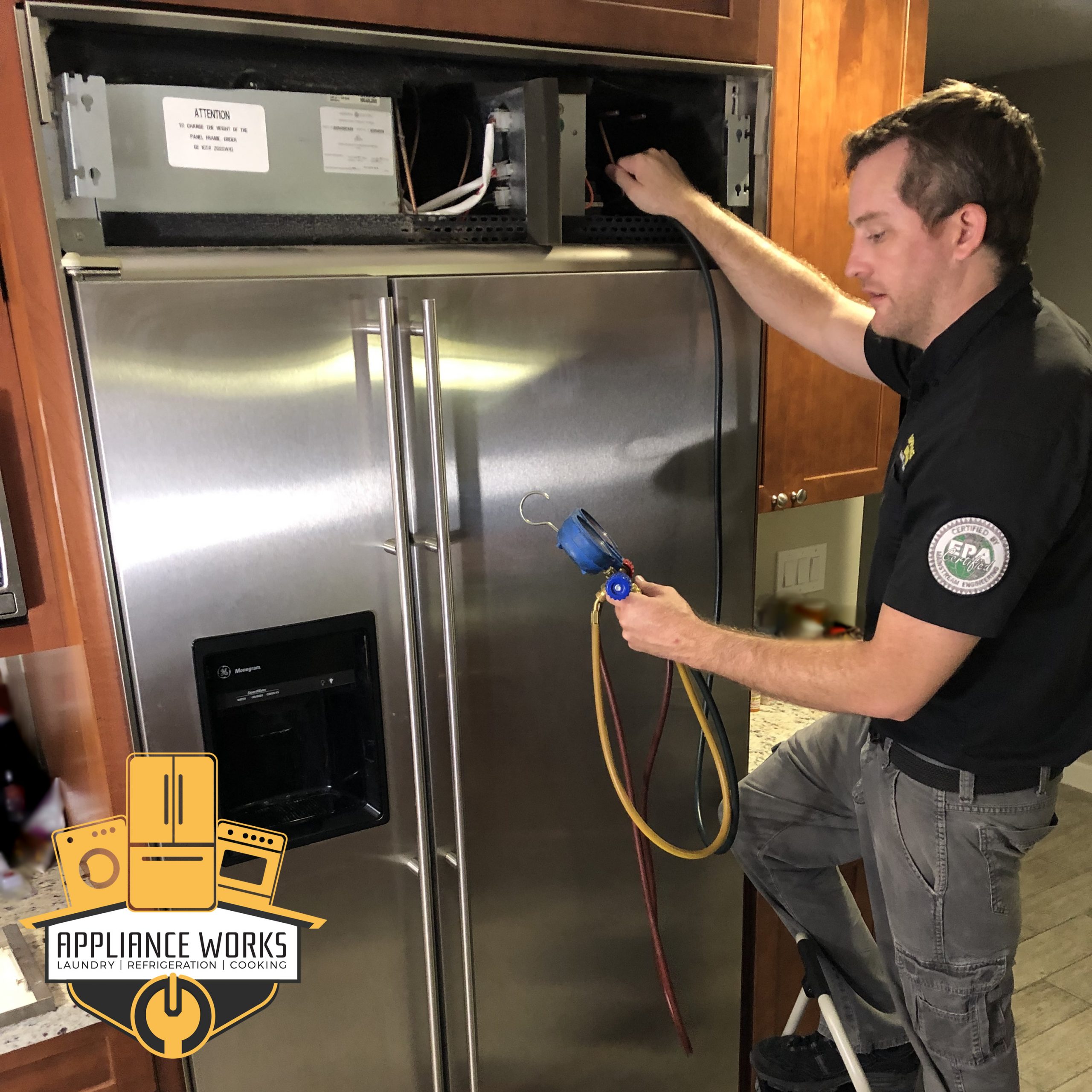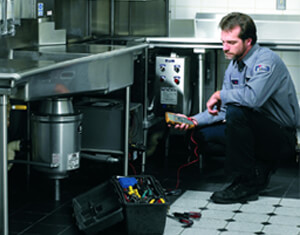GE appliance repair Oro Valley Dependable Refrigeration & Appliance Repair Service Shares 5 Safety Checks Every Homeowner Should Know
GE appliance repair Oro Valley Dependable Refrigeration & Appliance Repair Service Shares 5 Safety Checks Every Homeowner Should Know
Blog Article
Vital Tips for Effective Ref Repair Work to Extend Device Life Expectancy
When it pertains to your refrigerator, proper repair and upkeep are crucial for longevity. You might not recognize how tiny concerns can rise if they're left unaddressed. Routine examinations and basic solutions can save you from expensive substitutes down the line. Understanding common troubles and understanding when to act can make all the distinction. Let's check out some important pointers that will certainly help you keep your refrigerator running smoothly for many years ahead.
Understanding Common Fridge Problems
Refrigerators are essential in maintaining your food fresh, yet they can experience a variety of typical troubles that disrupt their performance. One constant problem is inadequate air conditioning. If you observe food spoiling quicker than typical, examine the thermostat setups or think about if the door seals are harmed. Another common problem is extreme sound, which could indicate a malfunctioning compressor or a stopping working fan. You could additionally experience water pooling inside or below the refrigerator; this typically arises from a clogged defrost drainpipe or a faulty water line. Additionally, if your refrigerator's light isn't functioning, it could be a straightforward bulb problem or a trouble with the door button. Lastly, ice accumulation in the fridge freezer can prevent air movement and cooling down effectiveness. Identifying these concerns early can save you money and time in repair services, guaranteeing your fridge runs efficiently and effectively.
Normal Upkeep Practices
To keep your devices running smoothly, you need to remain on top of routine upkeep methods. Tidy the condenser coils, examine the door seals, and keep an eye on the temperature level settings to guarantee peak performance. These basic jobs can save you time and cash on fixings down the line.
Tidy Condenser Coils Regularly
Cleaning your condenser coils on a regular basis can substantially improve your device's efficiency. Dirt and dirt develop up on these coils over time, creating your home appliance to function more challenging and eat more power. To maintain them clean, unplug your device and carefully remove any kind of safety covers.
Check Door Seals
3 straightforward steps can assist you assure your home appliance's door seals are in good condition. Second, tidy the seals utilizing warm, soapy water to remove any debris or grime. By complying with these actions, you'll preserve your appliance's performance and longevity, conserving you money on power expenses and fixings in the lengthy run.
Screen Temperature Setups
Consistently monitoring your device's temperature settings is essential for best efficiency and performance. Make use of a thermometer to inspect these setups regularly, especially after significant modifications, like relocating your device or readjusting the thermostat. By remaining proactive about temperature tracking, you'll assure your devices run smoothly and last longer.
Troubleshooting Cooling Problems
When your fridge isn't cooling effectively, it can result in ruined food and squandered cash, so dealing with the problem promptly is essential. Begin by checking the temperature settings to confirm they're at the advised degrees, generally around 37 ° F for the fridge and 0 ° F for the freezer. If the setups are right, examine the door seals for any type of gaps or damages; a damaged seal can permit cozy air to get in.
Following, take a look at the vents inside the fridge and fridge freezer. Validate they're not blocked by food items, as this can disrupt air flow. Listen for the compressor; if it's not running or making unusual noises, it might need attention. Finally, examine the condenser coils, normally situated at the back or base of the system. Dust and debris can build up, creating cooling down concerns. Clean them with a vacuum cleaner or brush to optimize performance. If problems persist, it may be time to call a professional.
Repairing Water Leakage and Ice Accumulation
If you're handling water leakage or ice build-up in your home appliance, it's crucial to determine the resource of the trouble. By identifying where the water is coming from, you can stop further concerns and avoid pricey repair work. Allow's explore some effective techniques to take on these typical issues.
Recognize Leakage Resources
How can you effectively recognize the resources of water leakage and ice build-up in your appliances? Begin by evaluating the seals and gaskets on your refrigerator and fridge freezer doors. By systematically inspecting these locations, you'll determine have a peek here the resource of the trouble, allowing you to take the necessary actions to repair it and prolong your home appliance's lifespan.
Avoid Ice Formation
To protect against ice development in your appliances, beginning by verifying the temperature level settings are suitable. If your refrigerator or fridge freezer is too chilly, it can bring about excessive ice build-up. Inspect the door seals on a regular basis; damaged seals can allow warm air in, causing condensation and ice development.
Keep the appliance well-ventilated and avoid congestion, as this can block air movement - Refrigerator repair experts Dependable Refrigeration & Appliance Repair. Routinely thaw your fridge freezer if it does not have an automated defrost attribute.
If you notice water leakage, determine and repair any obstructed drain holes, as they can add to ice buildup. Tidy the coils and confirm they're operating correctly to keep peak efficiency. Taking these actions will aid expand your device's life-span and performance.
Dealing With Noisy Fridge Appears
While it might appear startling, a noisy refrigerator usually signals small concerns instead of significant breakdowns. Identify the resource of the noise. Common culprits include the compressor, fans, and water lines. If you listen to a buzzing sound, it could be the compressor working hard; this might just be a regular procedure sound.
Next, inspect for loosened things inside. In some cases, containers or shelves can rattle, producing undesirable noise. Tighten or rearrange them to remove the sounds.
If you see a clicking noise, it may be the defrost timer. This is typically harmless but could suggest it requires examination.
Ultimately, confirm your refrigerator is degree. An out of balance home appliance can produce vibrations and sound. Use a degree to examine, and adjust the feet if required. Resolving these concerns immediately can assist preserve your fridge's performance and lengthen its lifespan.
When to Change Parts vs. Complete Substitute

However, if your appliance is older and experiencing several concerns, a full replacement can be a lot more cost-effective. Consider the cost of fixings versus the appliance's worth. If repair work go beyond 50% of a new system's rate, it's typically smarter to purchase a substitute. In addition, if you notice recurring problems that maintain persisting, it's an indicator that your appliance has reached the end of its life. Evaluate these variables thoroughly to make the very best decision for your demands and budget.
Knowing When to Call a Professional
Exactly how can you tell when it's time to contact an expert for home appliance fixing? If you discover unusual noises, smells, or leaks, it's a clear signal that something's wrong. Do not ignore these indications; they commonly indicate deeper concerns. If your appliance quits working entirely or frequently trips breaker, it's an additional warning.
You ought to also consider your very own convenience level with repairs. If you're unsure concerning identifying the problem or do not have the right devices, it's best to connect for assistance. Keep in mind, attempting complicated repairs can bring about more damages and even safety and security dangers.

Frequently Asked Inquiries
How Often Should I Tidy the Fridge Coils?
You ought to cleanse your refrigerator coils every six months. This aids maintain effectiveness and protects against overheating. If you observe excessive dust or pet dog hair, tidy them much more frequently to ensure your fridge runs efficiently.

Can I Make Use Of Vinegar for Cleaning My Refrigerator?
Yes, you can use vinegar to clean your refrigerator! It's an exceptional natural cleanser that removes smells and discolorations. Refrigerator repair experts Dependable Refrigeration & kitchen aid appliance repair Appliance Repair. Simply blend it with water, use it to surface areas, and clean down for a fresh, clean fridge
What Temperature Should My Refrigerator Be Set To?
You need to establish your fridge to 37 ° F(3 ° C) for perfect food preservation. This temperature maintains your food fresh while avoiding spoilage, guaranteeing your grocery stores last longer and reducing waste. It's an easy adjustment you can make!
Does a Fridge Need to Be Leveled?
Yes, your refrigerator needs to be leveled. If it's uneven, it can affect cooling down performance and create excess noise. Check the leveling legs and change them to ensure correct equilibrium for suitable performance.
How Can I Lower Fridge Power Consumption?
To lower your fridge's energy consumption, maintain it tidy and well-ventilated, check door seals for leaks, set the temperature in between 35-38 ° F, and stay clear of overloading it. These actions can significantly reduce your energy costs.
Report this page